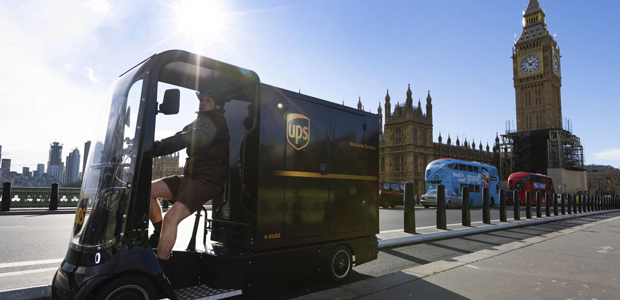
Embracing emerging and evolving technologies: the key to sustainable delivery
In logistics, we are accustomed to adapting to the unexpected - as we did nearly three years ago with the onset of the pandemic when we were forced to react swiftly and decisively to accommodate explosive new demand in B2C e-commerce.
This boom in e-commerce means more residential and urban deliveries which have sparked consumer expectations for more sustainable practices.
According to our UPS Smart Ecommerce report, 76% of European consumers said sustainable practices and services are important when choosing a retailer. Additionally, over 55% of younger consumers want a range of sustainable or alternative delivery options and 43% of those aged 55+. This trend is only anticipated to grow. Remaining agile and embracing emerging and evolving technologies will be vital in keeping up with changing market needs and customer expectations for faster and more sustainable delivery.
We see electrification as a key technology in meeting these changing market needs and customer expectations. Today, our global fleet has over 13,000 alternate fuel and advanced technology vehicles, including more than 1,000 electric and plug-in hybrid electric vehicles (EV) on the road.
We’ve also deployed electrically assisted cycles in over 30 cities worldwide that replace urban delivery vehicles, reducing emissions and congestion at the same time. It may come as a surprise that when UPS was founded in 1907, deliveries were made by bike. And that over a century later, we’re back to our roots - bikes. We’re experimenting with electrically powered devices that support delivery operators on foot. In London and Cambridge, we’re trailing a fleet of electric assist eQuad bikes. These four-wheeled electric-assist cycles allow our operators access to cycle lanes and zero-emission zones, as well as narrow city streets and dual-use pedestrian areas. In Hamburg, for example, we found that our bike operation can replace up to seven delivery trucks.
In London, the cycles run out of our Camden Hub which is home to the world’s first fleet scale smart-grid energy storage. The smart EV charging system developed with our partners Cross River Partnership, Moixa and UK Power Networks targets two bottlenecks of fleet electrification. Using the system, we’re able to scale our EV fleet without the need to upgrade the power supply connection. At the same time, we’re able to reduce the energy cost of operating EVs by optimising the timing of the purchase of electricity. This is all part of our journey to drive down the cost of EVs so they’re able to compete with the cost of diesel vehicles. At which point, electrification is no longer just about sustainability; it makes good business sense too.
And it doesn’t stop at our ground fleet, as one of the largest airlines in the world, we’re committed to sourcing 30% of our aviation fuel from sustainable sources by 2035. We have shown that electrification is feasible for small craft with our commercial drone services operated by our subsidiary Flight Forward. We’ve proven that time-sensitive deliveries can be carried out sustainably – notable for vital vaccine deliveries in Africa – and we’re working hard to translate this technology to larger aircrafts, for example through our electric vertical takeoff and landing (eVTOL) aircraft partnership with Beta technologies. The transition towards the electrification of aircrafts is complex and presents a host of challenges. As funding increases and technology evolves, partnering with start-ups and public authorities will be integral to creating viable solutions.
Collaboration with private and public partners is key to developing solutions and implementing emerging technologies that meet consumer demands for faster and more sustainable delivery. Governments must provide the right fiscal incentives and support mechanisms and we must urge policymakers to craft policy that is sustainable and economically viable and conducive to investment in sustainable solutions and innovation.
We are resilient, adaptable, and innovative when we work together. The pandemic forced the logistics industry to take a critical look at our operations and delivery models to meet changing consumer demands. It encouraged us to deepen our partnerships with public authorities and start-ups alike. Not only did we prove that we are able to innovate, scale and embrace new sustainable technologies, we have created momentum and opportunities to engineer positive change for a more sustainable future together.

